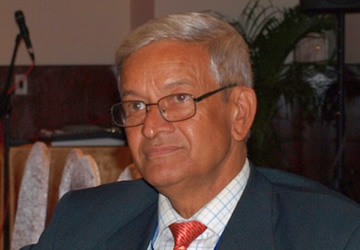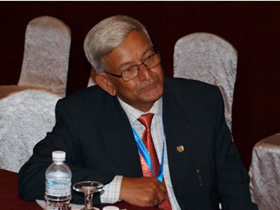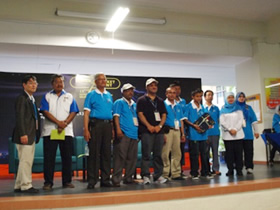Interview with Mr. Krishna Raj Adhikary, Chairman, Nepal Scientific Activities and Research Center (NESARC), at APRSAF-19 in Kuala Lumpur (Dec 2012)
The APRSAF Secretariat interviewed Mr. Krishna Raj Adhikary, Chairman, Nepal Scientific Activities and Research Center (NESARC), at APRSAF-19 in Kuala Lumpur, Malaysia, in December 2012. Being a Nepali representative in SEA WG, he talked about space education activities in his country, especially the APRSAF Space Education Seminar in Kathmandu held in March 2012.
Secretariat: You organized the APRSAF Space Education Seminar at Kathmandu in 2012. Could you tell us about the seminar?

At APRSAF-18 in Singapore, the Space Education and Awareness Working Group (SEA WG) decided to hold the APRSAF Space Education Seminar in Nepal from March 10–12, 2012. We had a very good experience, and it was very good motivation for the teachers of higher secondary and secondary school.
S: How was the reaction from the teachers?
They liked it very much. Science teachers from secondary schools and higher secondary schools participated in the seminar. I asked the JICA (Japan International Cooperation Agency) in Nepal to allow the participation of the members of JOCV (Japan Overseas Cooperation Volunteers) who have come to work in the local schools teaching students. Previously, I had asked the JICA in Nepal for a science teacher, but I understand that there was no science teacher available at that moment. Then I asked mathematics teachers to participate in the seminar, and they liked it very much.
S: I think that space education is not only for science but also for technology and mathematics, and in addition, the field of science has a very broad range.
Yes. Space science includes mathematics, physics, chemistry, and other subjects, but in Nepal, there is a science curriculum, but no space science-specific education. So I have requested the science teachers in Nepal to teach space science under the subject of science. For example, they can teach rocket science with Newton's law of motion. Similarly, they can have practice procedures for launching water rockets to show the connection with the force of gravity. These are the ways our schooling system approaches space education.
S:Can you tell us what your background is?
I am an engineer by profession. I studied surveying as a graduate student in India. Then I studied remote sensing and photogrammetry in the Netherlands for three years. I also have had space science training, including geo-information from Japan. I have participated in many training sessions through different agencies during the working period of my government service.
S: How did you come to the educational field at NESARC?
There is no space agency in Nepal, so I we have been trying to establish one. For that, we needed manpower, and I was searching for agencies who could offer capacity building for our future space agency. Then I found that APRSAF was a proper base for capacity building and would be suitable for students to work in and study space science. That is why I started to work with APRSAF, and the government decided to appoint me as a contact person for APRSAF SEA WG. When I retired from the government job, I asked some of the scientists in Nepal to establish the Nepal Scientific Activities and Research Center (NESARC) in Nepal. So we did.

S: When did you start to participate in APRSAF?
It was 2006 when I started the APRSAF activity. Earlier, I had been appointed by the government as a participant in the APRSAF activities of 2005. I started to participate in the meetings at the APRSAF SEA WG in 2006 in Jakarta, Indonesia.
S: What does APRSAF mean to your country? What do you expect from this forum?
I expect to have manpower for the space science activities in Nepal. The main goal is to establish a space agency in Nepal. For that, we need a lot of manpower to handle the space agency by ourselves. We have to make our own space agency in Nepal like JAXA, ESA, and NASA. For that, we need to develop human resources. In addition to this, we expect to work together with the other working groups of APRSAF.
S: Is APRSAF working well to achieve your goal?
Yes. This year, in 2012, we held a water rocket event. Many students and teachers participated in the event. Another time, many teachers participated in the space education seminar. They were very interested in having space education in Nepal. During the APRSAF seminar in Nepal, officials from the Geo-Informatics and Space Technology Development Agency (GISTDA) in Thailand gave a lecture with practical exercises on the software "GIS Tool Kits for School Children." This was another space science subject for the teachers. This is the reason that many people benefited from the seminar.
S: Do you have any plans to provide a follow-up to the successful seminar?
Yes, my plan is to hold some national seminars in different parts in Nepal. This one was held in 2012 at Kathmandu Valley, but my plan is to extend the seminar to the schools in remote areas. Otherwise, they will not be able to participate in the seminar. Next time, I am thinking of having some seminars outside Kathmandu Valley in the remote areas of Nepal. In 2012, the seminar was very fruitful for the schools that were nearby Kathmandu Valley. Now I am extending this to other areas of the country.
S: You are going to continue to expand your experience with APRSAF and support from SEA WG, aren't you?
Yes, I will continue to share my experiences, and I expect to have some support from APRSAF so that I can expand my space education and awareness activities and seminar proposals to other parts of the country.
S: I think the students will be interested in participating, and of course, the educators and teachers.

Nepali team at APRSAF-19 water rocket event
Yes. The seminar in 2012 had seventy-five students participate in the water rocket event, and about forty teachers participated in the training program. If I now ask the teachers to come and participate, there will be hundreds, because everybody was very interested in participating. Last year, 2012, it was the first time. If I do it for a second time, many students and teachers will be interested in participating in the seminar, and I will have to select the required number according to the proposed program. Of course, I cannot select all of them. I have to have several seminars at different times to manage those who are interested.
S: On the other hand, do you have any points or means to support or contribute to APRSAF?
Yes. My proposal is that I want to translate the materials that are prepared for the space education activities into the Nepali language so that our teachers and students can understand them better. I have also asked other countries if they have any materials and requested that they send them to me so that I can translate, print, and distribute them in our own language for the benefit of the students and teachers. That is my plan now. Similarly, other working groups of APRSAF are also working on capacity building in space science; I will support and work with them too.
S: In addition to that plan, you proposed joint educational tours at the working groups. Would you explain a little more about that?
In the working group, I made two proposals. One is a teacher exchange program. This means that our teachers from Nepal can visit the space agencies in different countries—Japan, India, Thailand, and Malaysia—so that they can see how their space agencies work, what they have to learn, and how they must teach the students and prepare for the space agency activities that will benefit our teachers. Similarly, the people working in the space agencies can go to Nepal and teach our teachers and students their activities and give lectures, and then study our teachers’ and students’ capacity for space science. Another proposal is a joint educational tour. This means our students can go to Japan’s, Malaysia’s, and Thailand’s space agencies so that they learn different cultures and educational activities, including space education activities. Those were my two proposals to the SEA WG.
S: Thank you.